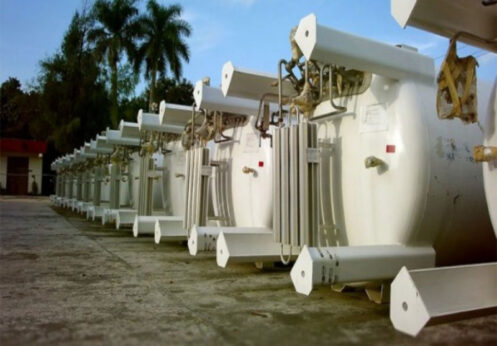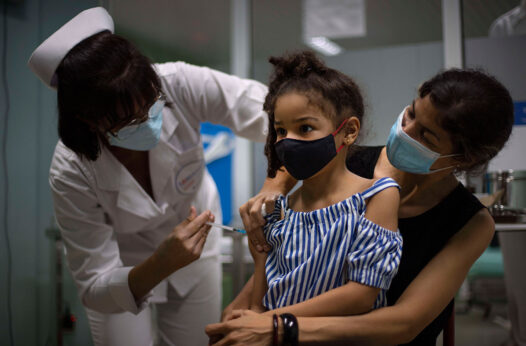
NEW YORK—When Cuba’s main oxygen production facility went down in the midst of the coronavirus pandemic and threatened access to life-sustaining treatment, the U.S. blockade magnified the danger and suffering for the Cuban people. The country’s Minister of Foreign Affairs, Bruno Rodríguez Parrilla, described the barriers presented by the blockade which stood in the way of access to the parts needed for repairs, a policy he called “criminal.” Rodríguez spoke at a gathering of solidarity activists on Sept. 25 at Cuba’s United Nations mission here.

In April this year, the World Health Organization labeled medicinal oxygen as an essential drug for the treatment of COVID-19. Producing medical-use oxygen is a complex process, but having the material available is a life-or-death issue. In the production of oxygen, the air is cooled down to minus 186 degrees Celsius. The gas condenses and, once liquefied, is transported in tanker trucks to hospitals, where it is introduced into tanks returning it to the gas state to be administered to patients. According to General Manager of OxiCuba S.A., José Manuel Gámez, Cuba worked from 1997 to 1998 to create its own oxygen-producing capabilities, but the main plant which supplied 95% of the island’s supply suffered a breakdown on May 26 this year.
The blockade, Rodríguez said, had been carefully designed to provoke the maximum damage to the Cuban people. He mentioned, in particular, the 200 new restrictions that were imposed by the Trump regime. While some progress was made during the Obama era, he said, the blockade continues.
Rodríguez called on Biden to honor commitments he made to roll back the Trump sanctions, highlighting three important areas: remittances sent from Cubans abroad to the island, lifting of restrictions on travel, and restoration of consular services by the U.S. in Cuba.
Rodríguez cited the difficulties faced by Cuban citizens in getting visas to the U.S. Any Cuban citizen wishing to travel to the U.S. must travel to Guyana to apply for a visa. As part of the process, the applicant must show proof of having had a medical examination; however, medical exams done by Cuban doctors are not accepted, and the applicants are forced to pay exorbitant costs for examinations by Guyanese doctors.
Rodríguez also addressed the demonstrations that occurred in early July in Cuba. He singled out six Miami-based social media sites in asserting that many acts of violence and vandalism had been incited by private Facebook and Instagram groups. Evidence has emerged of payments having been offered for attacks on police, he reported. One demonstrator was killed when a policeman had to use deadly force in defending himself from attack. While some demonstrators were briefly detained, none were held and most were released with cautions.
Rodríguez decried the use of false images by media in reporting on the July events. For example, crowd scenes from Egypt and Argentina were presented as anti-government crowds in Cuba and a demonstration of government supporters, led by Cuba President Miguel Diaz-Canel, was described as a demonstration of government opponents.
Rodríguez reflected on the challenges faced by the Cuban people as the blockade’s severe restrictions magnified the damage of the pandemic. Nevertheless, as difficult as the challenges are, he said, it’s not as bad as it was during the “special period” which occurred after the collapse of the Soviet Union.
Now 63, Rodríguez was elected in 1990 at age 32 to the Central Committee of the country’s Communist Party, just before the beginning of the “special period.” The year 1994 was particularly bad, he recalled, but today’s young Cubans, such as his own son who is 21, don’t remember that period. Even during this pandemic, he noted, basic development projects have not been abandoned.

In fact, despite the blockade, the pandemic situation in Cuba compares favorably to that of the rest of the hemisphere, and the Cuban public health system has managed to keep the fatality rate much lower. A vaccine developed in Cuba is as effective as the U.S.-made Pfizer vaccine, Rodríguez reported. That vaccine is being used in Haiti, where Cuban doctors were present before the pandemic and where they continue their humanitarian work. In addition, Cuba has recently sent many doses to Vietnam. The oxygen plant was restored to full operation in late September and depleted backup oxygen supplies across the island are being replenished.
The pandemic has had the effect of weakening imperialism, Rodríguez argued. Imperialism, he said, had held itself up as some kind of model or ideal. “This was starkly revealed as false. The pandemic revealed the worst face of imperialism and its near total dysfunction,” he declared.
Rodríguez expressed his confidence in progress and a future of prosperity and social justice. He predicted that the U.S. will no longer be able to impose conditions unilaterally. He emphasized the importance of support and solidarity of the progressive and fair-minded people in the U.S. Although imperialism remains powerful, he contended, “No force can obstruct such support and solidarity.”
Roberta Wood contributed to this story.










